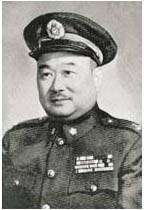Liu Chih
| Liu Zhi | |
|---|---|
 General Liu Zhi | |
| Nickname(s) | The Long-legged general |
| Born |
1892 Ji'an, Jiangxi |
| Died |
1971 Taichung, Taiwan |
| Allegiance |
|
| Years of service | 1914-1970 |
| Rank | General |
| Unit | first corps |
| Commands held | Suppression General Headquarter of Xuzhou Garrison |
| Battles/wars | Central Plains War, Huaihai Campaign |
| Awards | Order of Blue Sky and White Sun |
| Other work | Politician, Historian |
Liu Chih (Chinese: 劉峙; pinyin: Liu Zhi; 1892–1971) was a prominent Kuomintang military and political leader in the Republic of China.
Biography
Liu was born into a peasant family in Jiangxi province in 1892. His parents died when he was young and he was raised by his grandfather. He was educated in a local school before travelling to Japan to receive advanced education. When the Japanese government started to expel Chinese students on behalf of the Manchurian imperial government, he returned to China and enrolled in military academies in Wuhan. In 1914 he entered the Baoding Military Academy and after serving in numerous regional armies, Liu joined the faculty of the Whampoa Military Academy in 1924 and became a field commander during the Northern Expedition. He became friends with many important allies of Generalissimo Chiang Kai-shek and they proved to be extremely helpful to his rise in the KMT government.
Rise and fall in the KMT government
He was instrumental in defeating Chiang's rival warlords in the Central Plains War and expanding KMT military power throughout the 1930s by defeating Chinese Communist forces in Henan Province. Chiang Kai-shek rewarded him by appointing as governor of Hennan Province and named a county after him. When the Second Sino-Japanese War broke out, Liu was named as deputy commander of the first war zone and commander-in-chief of the 2nd Army Group. By this time he seemed to gradually lost his military prowess when the Imperial Japanese Army easily overwhelmed his forces and breakthrough the Chinese defensive lines despite being greatly outnumbered. Liu was forced to abandon much of Hebei province in North China and this defeat contributed to the 1938 Yellow River flood and he was relieved from his posts by Chiang. When the nationalist government retreated to Chongking, Chiang again named him as commander of the city's air defense. When the Japanese air force started the bombing of Chongking, Liu proved too ineffective to provide much leadership to stop the Japanese terror raids and raise civilian morale, and was dismissed in 1942. In 1942 he succeeded General Li Zongren as commander-in-chief of the fifth war zone. When War with Japan was over, he was named as pacification director of Zhengzhou garrison, controlling first and fifth war zones. When the Campaign of the North China Plain Pocket broke out in the summer of 1946, he failed to destroyed the communist forces under Marshal Liu Bocheng and Deng Xiaoping and was relieved of his command once more. In the fall of 1948, He became the commander-in-chief of the Suppression General Headquarter of Xuzhou Garrison, controlled some 800,000 nationalist soldiers, but when his capable deputy commander-in-chief Du Yuming was recalled to Manchuria to salvage the nationalist positions there when Marshal Lin Biao launched the Liaoshen Campaign on September 12, 1948. He went into a panic and did not organize an effective defensive line around his command sector when communist commander Su Yu attacked Xuzhou in the Huaihai Campaign. Although President Chiang Kai-shek again dispatched Lieutenant General Du Yuming to save the situation, but Liu's ineffective leadership and timidness has already doomed KMT position in Central China. When the communist forces finally defeated the nationalist troops the next year and deputy commander-in-chief Du Yuming was captured, Liu was again fired by Chiang Kai-shek, who was lucky enough to escape Xuzhou via plane.
Taiwan
Liu first fled to Hong Kong then made a living in Indonesia as a Chinese language teacher, in 1953 he was allowed to return to Taiwan as a political advisor to Chiang Kai-shek. He was decorated with the Order of Blue Sky and White Sun, he died in Taiwan in 1972.
Evaluation
General Liu Zhi's early military career was full of victories and successes, but he seemed to lose his combat skills after the outbreak of the Second Sino-Japanese War, many of his colleagues called him The Long-legged general or President Chiang's Lucky General, to poke fun of his uselessness on battlefield and shamelessness when many other talented officers were not promoted for heroic deeds and he was brazenly enough to accept such high positions. Even the first lady Soong Mei-ling said to President Chiang Kai-shek:" There are many people spoke negatively about General Liu Zhi, Are You still going to use him?" Chiang replied calmly:" Liu is a mess on battlefield, but he is more obedient than all my commanders."
See also
References
- US Naval War College
- Ministry of National Defense R.O.C